Which Industries Benefit Most from a Stainless Steel Electric Cargo Tricycle?
Your customers work in tough industries. A standard tricycle frame won't last, costing you money in repairs and damaging your brand's reputation. Let's match the right frame to the right job.
Industries like sanitation, food delivery, seafood markets, and chemical plants benefit most. A stainless steel frame resists corrosion, simplifies cleaning, and ensures a longer, safer service life in these demanding environments, protecting your investment.
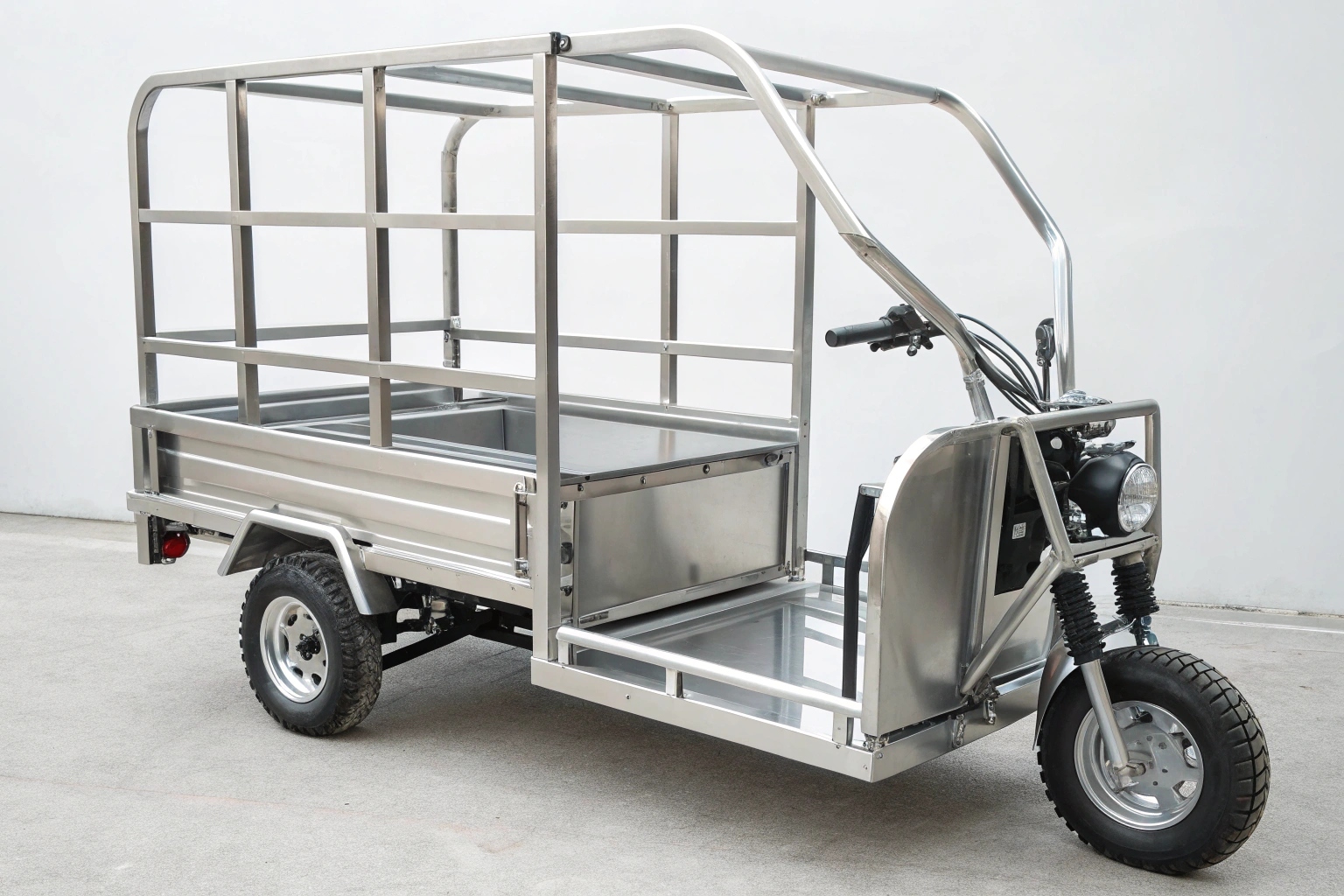
As a factory, we don't believe in "one-size-fits-all." We help our clients choose specifications that make sense for their end customer. One of the most critical choices is the frame material. An importer might save a few hundred dollars on a painted iron frame, but if their customer is a fishmonger, that tricycle will be a rust bucket in a year. The right material choice isn't an upgrade; it's a fundamental requirement for the job. Let's explore which industries absolutely need acero inoxidable.
Why Are Stainless Electric Cargo Tricycles Essential for Sanitation and Waste Management?
Your city's sanitation fleet has tricycles rusting away. They look terrible, require constant repainting, and might even become structurally unsafe, creating a public hazard and high replacement costs.
Stainless steel is essential because it is immune to the corrosion from wet waste, cleaning chemicals, and constant washing. This guarantees a longer vehicle life and dramatically lowers maintenance costs for busy municipal sanitation fleets.
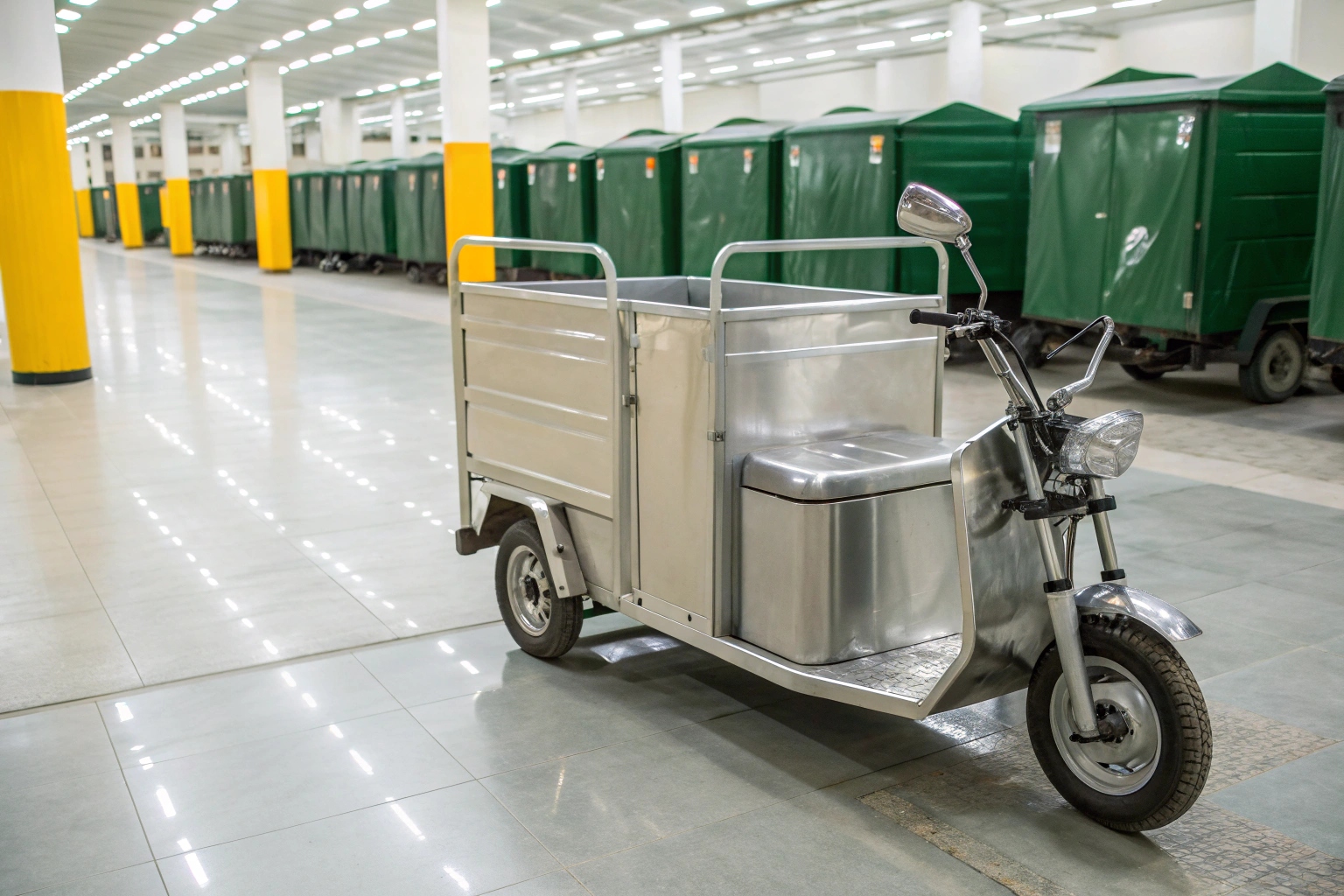
We've worked with government sanitation projects, and the number one enemy is rust. The liquids that seep from garbage bags are acidic and highly corrosive. Painted iron frames start to peel and blister almost immediately. According to UN-Habitat, cities generate over 2 billion tons of waste a year, which requires tough, reliable vehicles. A stainless steel frame solves the rust problem permanently. It can be pressure-washed daily without any risk of damage, keeping the fleet hygienic and operational.
- Resistencia a la corrosión: It won't rust, even when exposed to corrosive fluids and harsh cleaning agents every day.
- Superior Hygiene: The non-porous surface of stainless steel is easy to sterilize and doesn't harbor bacteria like chipped paint and rust patches do.
- Reduced Lifetime Cost: Eliminates the constant need for sanding, rust repair, and repainting, which saves a huge amount on labor and downtime.
How Do Stainless Tricycles Improve Food and Fresh Produce Delivery?
Delivering fresh food in a rusty vehicle is bad for business. It looks unhygienic, risks contamination, and can destroy your reputation with restaurants, hotels, and grocery clients.
Stainless tricycles are perfect for food delivery because their surfaces are hygienic, non-porous, and easy to clean. This protects food safety, prevents cross-contamination, and helps reduce spoilage during transport, directly saving money.
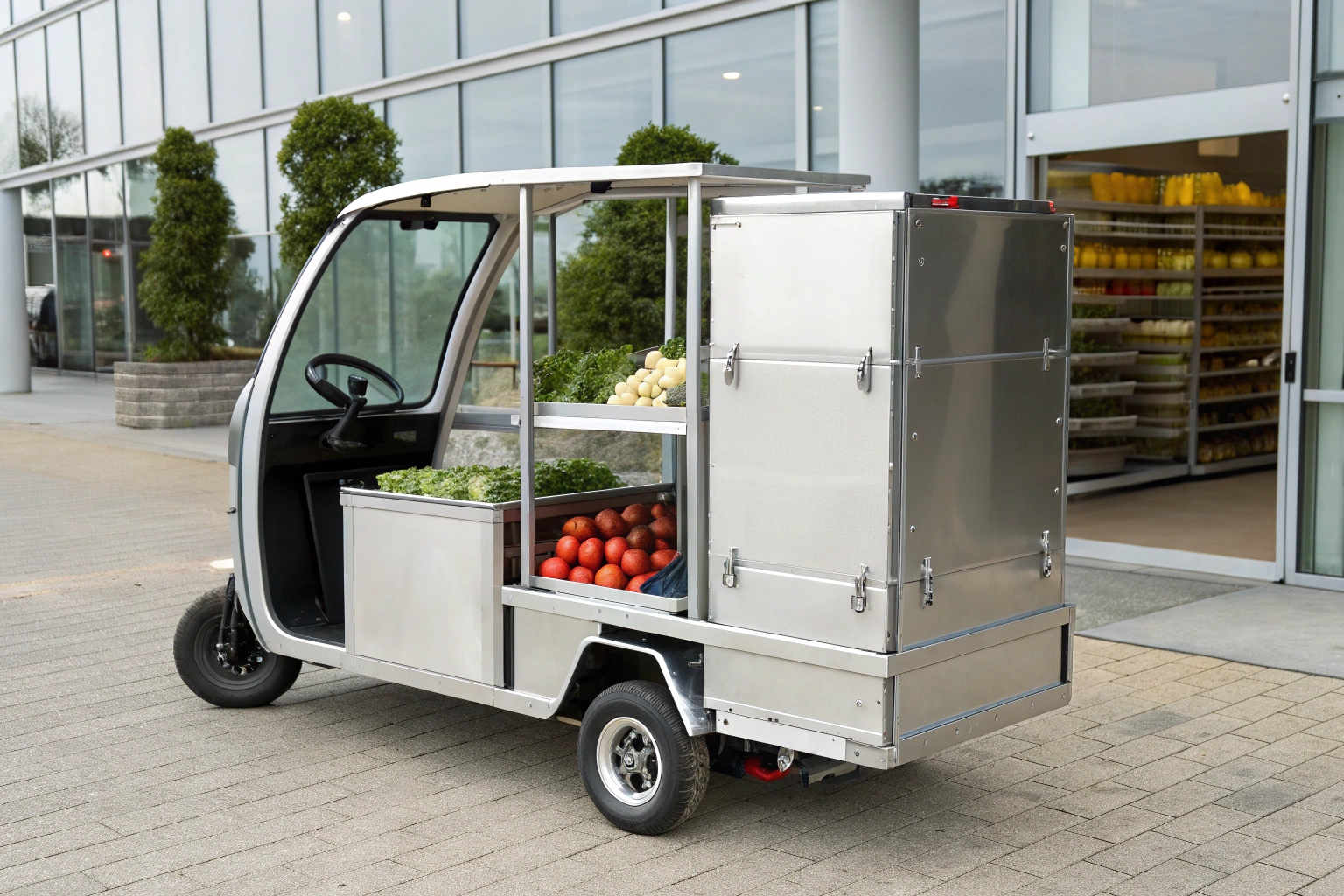
Food safety is not negotiable. The FAO notes that 14% of global food loss happens during transport, often due to poor hygiene. A painted iron frame that is chipped or rusty can introduce contaminants to food products. Stainless steel is essentially a food-grade surface. This is why it's used in commercial kitchens. It gives your clients confidence that their deliveries are safe and professional. For businesses moving chilled goods, the condensation that forms won't cause any rust, unlike with a standard frame.
| Industria | Typical Use Case | Key Benefit of Stainless Steel |
|---|---|---|
| Restaurants | Ingredient & prepared food transport | Easy to sanitize, professional appearance. |
| Grocery Distribution | Moving fresh produce, dairy, meat | Prevents cross-contamination, withstands wet conditions. |
| Cold-Chain Logistics | Transporting iced or refrigerated goods | Immune to rust from condensation and moisture. |
Why Are Stainless Electric Tricycles the Best Choice for Seafood and Wet Markets?
Operating in a wet market or near the coast is brutal. The salty air, constant moisture, and ice will turn a standard iron frame into a pile of rust in just a few months.
They are the best choice because stainless steel is completely immune to saltwater corrosion and constant moisture. It maintains a clean, professional look and its structural integrity in environments that would rapidly destroy an iron frame.
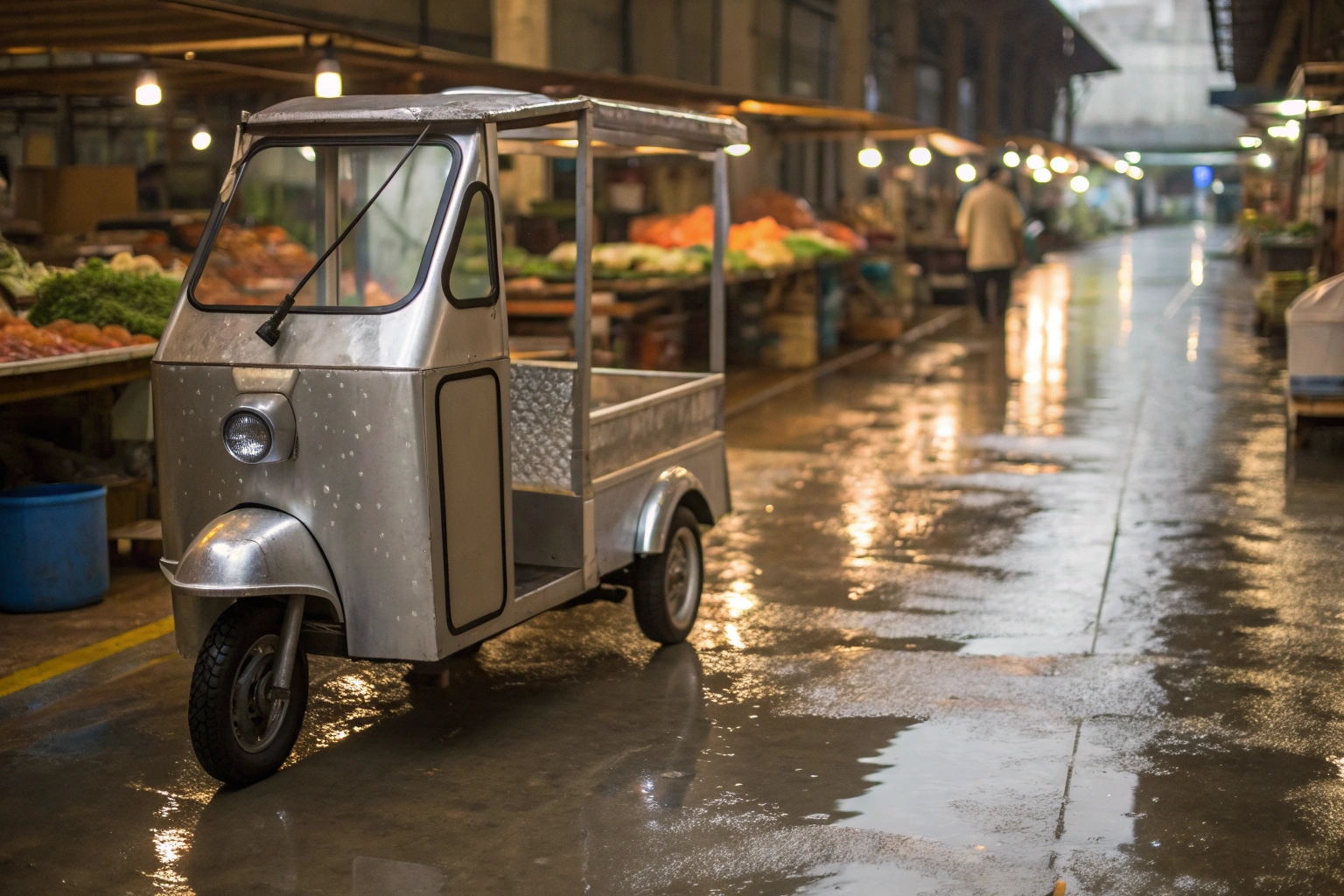
From my experience, this is non-negotiable. We export many units to island nations, and for our clients there, stainless steel is not an option—it's a requirement. The World Corrosion Organization states that corrosion can account for up to 30% of maintenance costs in marine industries. Salt air is poison for painted steel. Once you get a scratch, the frame is compromised. Stainless steel frames are built to handle this environment day in and day out.
- Immunity to Saltwater Corrosion: The material itself resists the corrosive effects of salt spray and seawater.
- Easy Cleaning: Can be hosed down with fresh water at the end of the day to remove fish scales, ice, and salt without any fear of causing rust.
- Long-Term Durability: The frame's strength and value are preserved, ensuring a better return on investment in the toughest conditions.
How Do Industrial and Chemical Facilities Benefit from Stainless Steel Tricycles?
Moving parts and materials inside a big factory seems simple. But accidental chemical spills, high humidity, or clean-room requirements can damage standard vehicles, causing safety risks and expensive delays.
Factories and chemical parks benefit because stainless steel resists chemical spills and will not rust in humid warehouses. This extends the vehicle's service life, reduces maintenance downtime, and improves safety in sensitive operational environments.
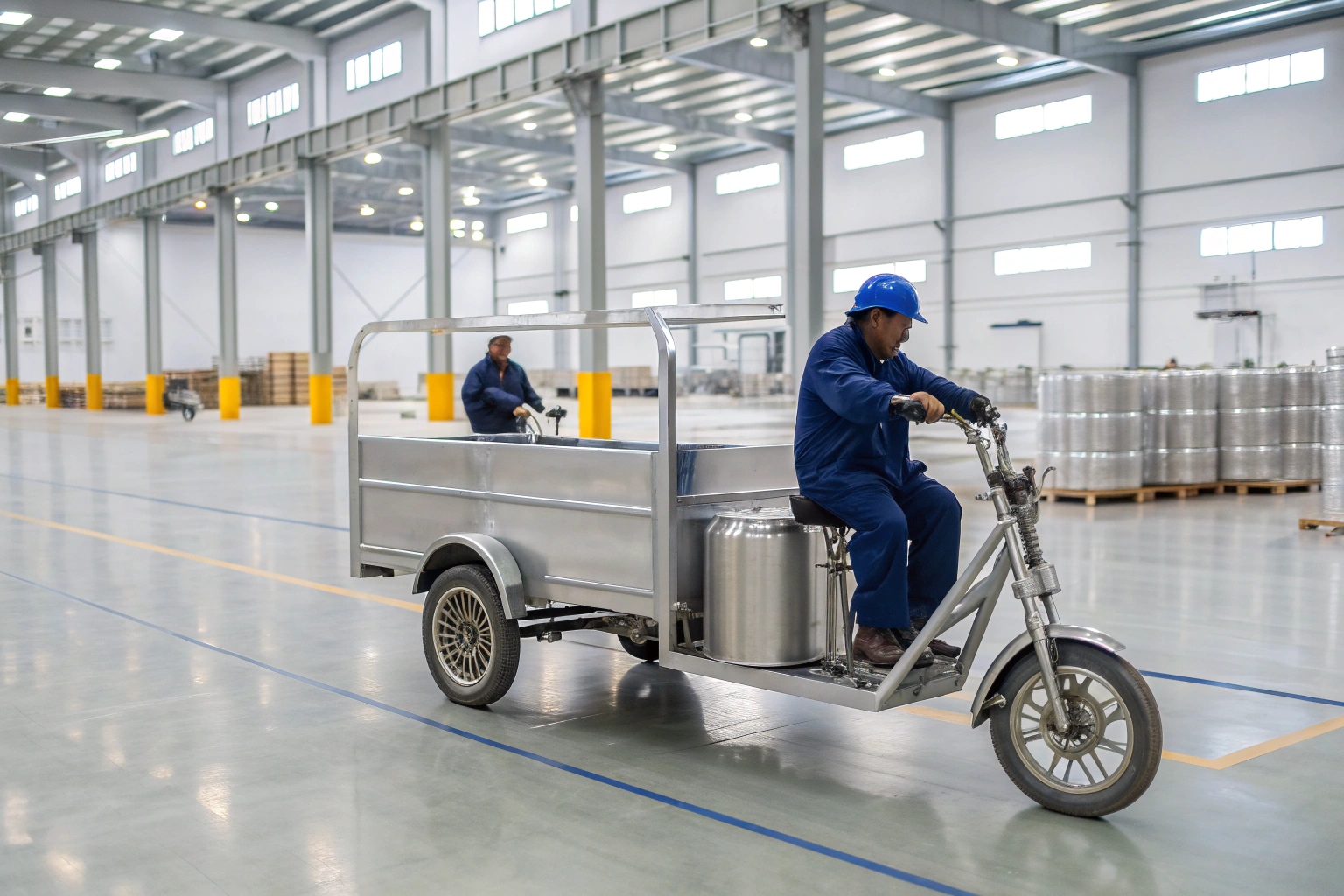
In an industrial setting, reliability is everything. Downtime in a large facility can cost over $10,000 an hour, according to McKinsey research. A tricycle used for internal logistics is a critical part of that chain. If it breaks down due to corrosion, the whole operation can suffer. Acero inoxidable provides peace of mind. It can withstand accidental spills of many common industrial acids and alkalis. In warehouses with no climate control, humidity won't cause rust. It’s a tougher, more reliable tool for a demanding industrial job.
| Facility Type | Typical Load / Environment | Advantage of Stainless Steel Frame |
|---|---|---|
| Chemical Plant | Transporting lab samples, small drums | Resists corrosion from accidental chemical spills. |
| Food Processing | Moving ingredients in a wet/wash-down area | Hygienic and will not rust from constant moisture. |
| Large Warehouse | Moving tools and parts in humid conditions | Prevents rust, reducing maintenance downtime. |
Conclusión
Choosing a stainless steel frame is a strategic business decision. It targets key industries where durability is paramount, delivers a longer service life, and provides a much better return on investment.

